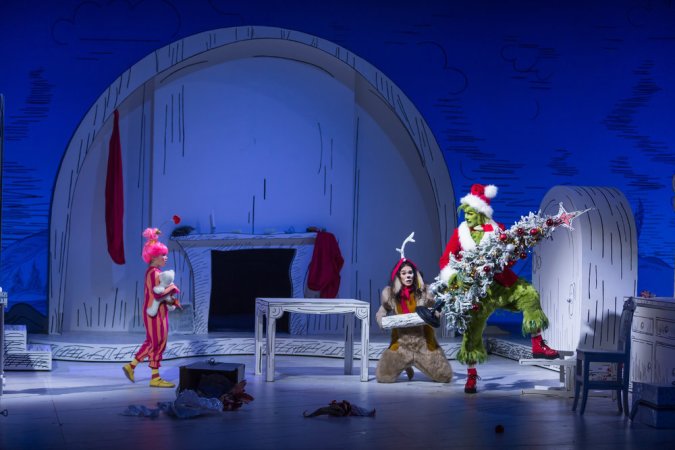
‘Christmess’ // Bonsai Films
‘Christmess’ was self-aware.
What do a drug addict and an actor have in common? Sounds like the start of a joke, but it’s the premise of the new dry comedy film ‘Christmess’. Presented by Bonsai Films, the movie blends the humour of some awkward dad jokes with the drama of a halfway house.
Featuring a small cast of four, the plot follows Chris Flint, a recovering addict and washed up Silver-Oscar winning actor as he exits rehab and prepares to spend Christmas with his sponsor, Nick, and fellow sponsored, Joy. He takes a short gig as a shopping centre Santa while trying to reignite his failed relationship with his daughter, Noelle.
As a Christmas film, it deep-dives into the core themes of family and celebration. For ex-addicts, both family and celebration can be triggering. In terms of family, it discusses the challenging of difficult upbringings and the disconnects caused from a family’s response to addiction. In regards to celebration, it looks at an addict’s difficulty in celebrating without risk-taking, alcohol or substances. While family and celebration are commonly considered positive and meaningful parts of life and holidays, they are also two of the most challenging aspects. ‘Christmess’ does well to treat this message with respect.
Religion appears at minor points in the film: the saying of grace over dinner and the protagonist turning to the Bible when his daughter fails to follow through on plans. Given the Christmas context, the religious undertones could have been further explored.
Throughout the film, day scenes were flooded with haze, particularly when Chris, Nick and Joy congregated in their lounge room. This added a dreamlike quality to the visual, and may have been symbolic of the liminality both Chris and Joy find themselves in. Furthermore, it may have been a reference to the haze felt by many during a hangover state, and the effect of light on the eyes the morning after strong liquor.
Surprisingly, it was the outdoor evening shots that were the most crisp and intriguing. A scene outside of a pub between Chris and his daughter, Noelle, was very clear while maintaining the sense of a late-night event and a moody atmosphere.
Costumes were forgettable, but the setting was intrinsically Australian: a 1960s housing commission kitchen, a trolley disregarded on the lawn, a gas cylinder dragged down to the servo, a montage of urban graffiti and shops, a crocheted blanket sprawled on a recliner and a milk crate step to jump a colourbond fence. The choice to showcase a working class urban Aussie landscape was poignant and befitting to the story.
From the opening shots, the film is full of closeups and uncomfortable framing. Mirrored by eerie music, the fear of leaving rehab is felt not only by the protagonist but the audience. A high-angle shot captures the apathy of the supposed counselor, reflective of the lack of care for ex-addicts in the Australian psyche, and is mirrored in Chris’ sentiments about “returning to the real world”.
One of the most intriguing scenes, with regards to shots, was the role play therapy between Chris and his halfway house peers. It was reflective of his dependence, not on drugs but on playing roles his whole life, both on and off stage. A jarring mix of closeups, rear shots and side angles made for a visually interesting exploration of his emotions. While it was nearly a “through-their-eyes” experience, it was as if the audience was one step behind, slightly disconnected.
Direction by Heath Davis was mostly well-paced, but as writer his script could have used some additional work. The scenes never felt too long, and he used the variety of locations to his advantage. However, some of the story arcs were lacking, such as the outburst from Nick about Chris’ self-obsession, when throughout he came across as quite selfless (albeit an addict). Additionally, Joy’s reaction to seeing an old friend with a new partner seemed out of character and extreme in contrast to her previous scenes.
Steve Le Marquand (‘Home and Away’, ‘Rake’, ‘Underbelly’, ‘June Again’) as Chris Flint was humble and kind, allowing the viewer to empathize and connect.
Darren Gilshenan (‘Stateless’, ‘Janet King’, ‘The Moodys’, ‘Dark City’) as Nick, while not always a likeable character, gave a brilliant performance. His outburst toward Chris near the end of the film was explosive and very well-acted, considering its out-of-place feel in the script, and his acting choices in the pub were calm but effective.
Hannah Joy, as Joy, was an excellent vocalist and the use of these talents was a nice addition to the film. At times her acting choices seemed out of place and jarring, however, as the film progressed her intention to show the ongoing effects of substance abuse on a person’s bodily movements made sense. Joy’s crispy vocals paired with the balanced visuals in her pub gig were a standout scene of the film.
This scene was also the first time in which the viewer sees Nick or Joy interact with people outside of the house and aside from Chris. It is alluded to in the car park by Aldi and in the driveway of Noelle’s place, but this scene solidified their existence beyond Chris.
One of the major motifs of the film was the subject of actors and addicts. In many ways this parallel was a character of its own. Jokes about “method actors” sound like “meth head actors”; about shop Santas being ex-NIDA grads; a jarring statement about how both actors and addicts are skilled liars all culminated in a self-aware question.
The self-awareness of the film was made clear from the start with the crack, “I’ve sat through your awful Christmas movie”, as was the clear intention to show the loneliness of life and its amplification at the holidays. ‘Christmess’ is slow-paced, dad-joke heavy but a decent Sunday afternoon viewing.
‘Christmess’ opens in Australian cinemas on 30 November 2023. Watch the trailer here.






